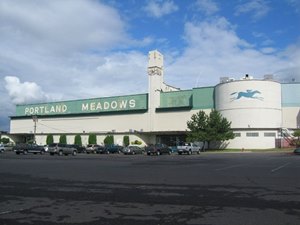Grants Pass to Fill Anticipated Portland Meadows Void


With the planned closing of Portland Meadows, state racing industry leaders are rallying around a plan to have fair circuit track Grants Pass take over commercial dates in Oregon.
Travis Boersma, owner of TMB Racing that has been awarded 35 dates a year for commercial racing at Grants Pass, is looking forward to the new challenge for the track located on the Josephine County fairgrounds in Southern Oregon.
Boersma, also a racehorse owner, said upgrades are needed. Plans include widening the track to allow for a 10-horse gate and lengthening a chute to the five-furlong main oval to allow 440-yard Quarter Horse races, up from 400 yards. He also said improvements will be needed on the backstretch and on the front side.
But Boersma is committed to making those changes to help keep Oregon racing going as The Stronach Group's Portland Meadows plans to close after a 74-year run. Grants Pass is approved for 35 dates each fiscal year through 2022 beginning July 1.
Portland Meadows Will Not Reopen for Racing
"I think it's really important to continue live racing in Oregon. It has some tradition here—Portland Meadows opened in 1946," Boersma said. "A lot of us are concerned about the future of live racing here, and we want to do something for all of the people involved. There are so many jobs tied to this, horse people and others."
At its nine fair dates in 2018, Grants Pass offered 51 races that averaged 6.0 starters per race. The average purses per day was $17,039; and the average per race was $3,000. As the commercial license holder, the track should be in a position to improve those numbers closer to the Portland Meadows standards. At the most recent Portland Meadows meet—37 race days from Sept. 30-Feb. 5—the track offered average daily purses of $52,971 and $6,735 per race.
As the commercial license holder, Grants Pass will have simulcast rights, which fuel purses. Also, Oregon allows the commercial license holder the ability to offer historical horse racing games, which can further improve purses.
Boersma noted there's a lot of work to do off-track as well. With the simulcast rights, Grants Pass could line up a partner to handle that end of things. Getting the signal sourced out to various simulcast outlets and advance-deposit wagering sites will be critical to driving purses.
Another priority is working on a race schedule that works for horsemen and fans, according to Boersma. This year Grants Pass will run its traditional nine fair dates in June before offering its first commercial license racing in the fall, beginning in September. Tentative plans call for a Sunday-Monday schedule—Sunday as a chance to draw fans out to the track and Monday as more of a good fit in the simulcast market.
"We want to make the schedule work for everyone," Boersma said. "Our first priority will be to not step on anyone's toes in-state, then we'll look at what works best with Emerald Downs and some of the Northern California meets."
Lynnelle Fox Smith, executive director of the Oregon Thoroughbred Owners and Breeders Association who also has a leadership position in the Future of Racing in Oregon Group—which brings together state Thoroughbred and Quarter Horse industry interests—said the expected closing of Portland Meadows is problematic, but she sees plenty of positives in the state as well.
"As breeders, we're very concerned because our breeding numbers have not been strong the last several years because of a number of factors—our economy, competition nationwide has affected horse racing.
"We're excited for this new chapter, however. We're still going to have commercial racing. We still have a strong fair circuit."
One built-in advantage for Oregon is the state regulates the vast majority of the handle generated by the nation's ADW providers. It's a low tax but a huge handle number—last year it exceeded $4.2 billion—and some of the money generated has been committed to purses and breeders. For instance, each fair race receives about $2,000 in purse funding.
Fox Smith said the state's fair meets continue to be well received and often provide important economic stimulus for the rural areas where they're offered. Besides Grants Pass, there is the Eastern Oregon Livestock Show, Tillamook County Fair, Harney County Fair in Burns, and the Crooked River Roundup.
"Our fair meets—we have five county fair meets—and those have always been very strong. It supports the whole economy in some of those counties," Fox Smith said. "Oregon is spread out, and we have the tiny community of Burns. That race meet there brings in a huge amount of support for that community. So those are meets we definitely want to continue and they'll be kind of our bedrock, and we can expand and grow this commercial meet even more.
"Other fair meets are putting in some improvements. The fair meets are fun here—a really good time, so community-based, it's great to see," Fox Smith said. "We can keep breeding going. Breeding is going to be strong here. We've added programs that have had a huge impact, and I know it's on a small scale compared with some larger racing states.
Fox Smith noted Portland is a growing community that will need entertainment options and speculated another track could one day be opened there to capitalize on that market—giving the state two commercial tracks.
"It's a growing market, adding 1,000 people a week, and it's over 2 million people," Fox Smith said. "We could have racing at Grants Pass and Portland. Then you could race almost year-round. It's time to invest in Oregon."
